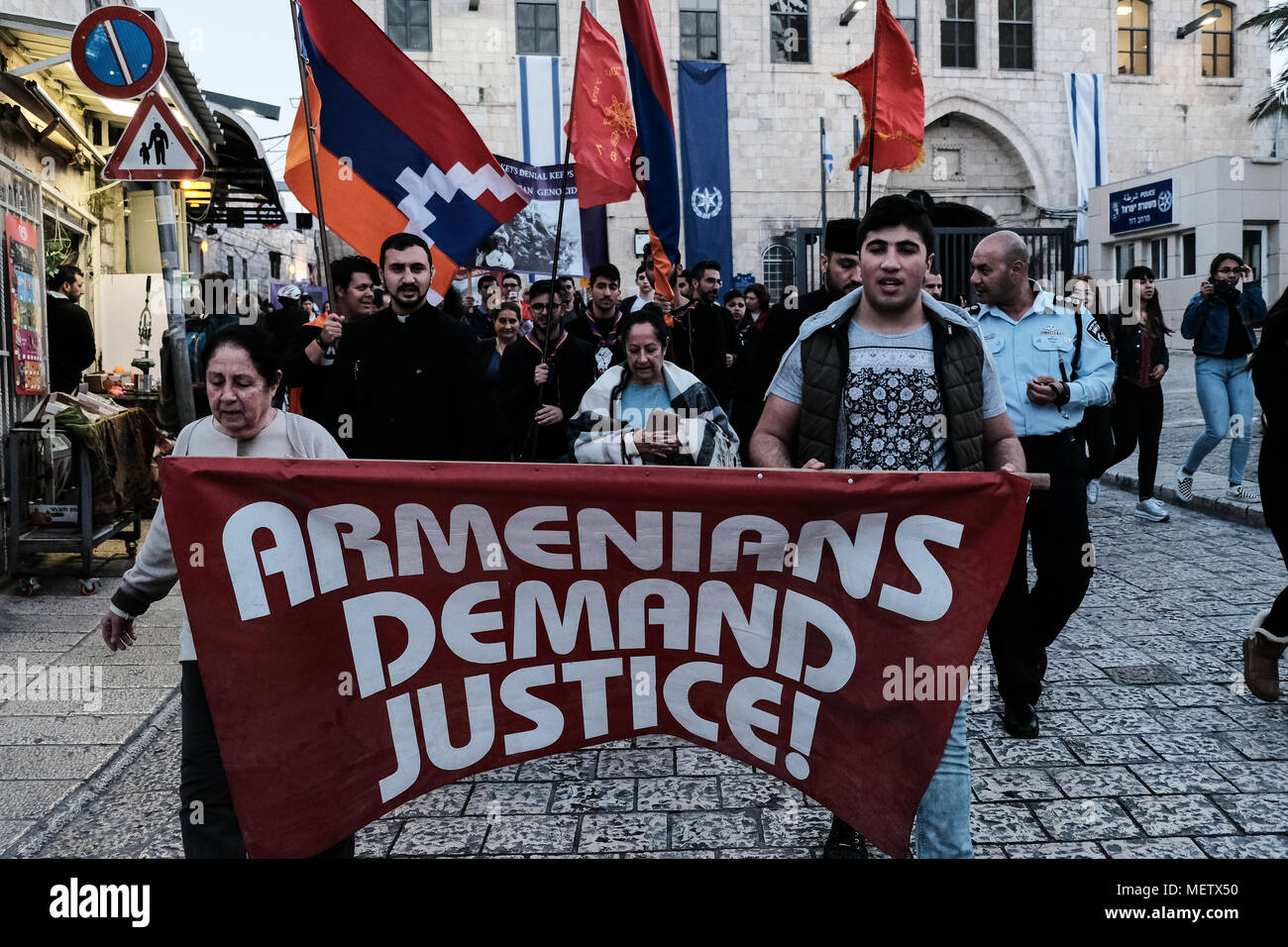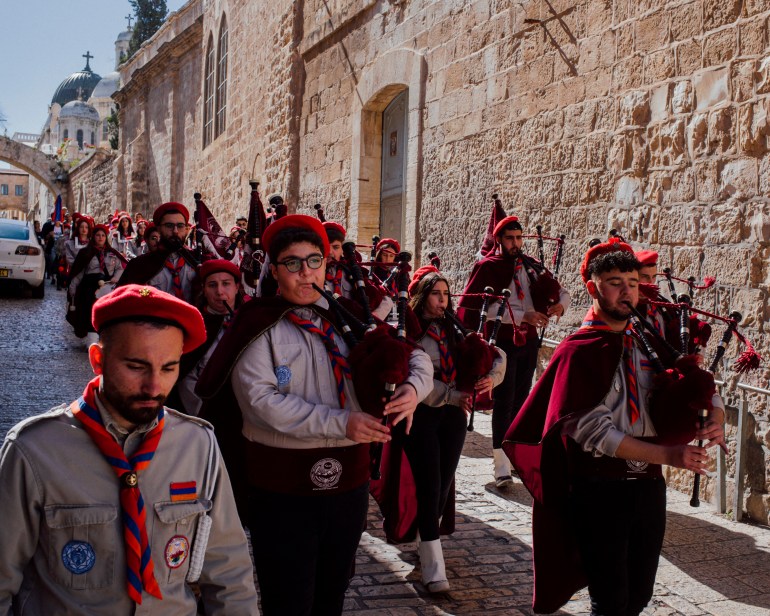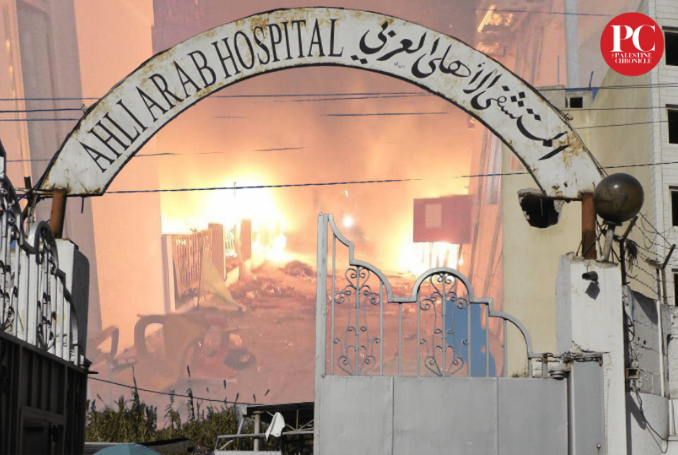
A controversial real estate project threatens the world’s oldest Armenian diaspora community. But they refuse to move.
‘We Won’t Leave’: Armenians in Jerusalem
Push Back Against Armed Settlers
Al Jazeera Staff
Old City, occupied East Jerusalem (November 24, 2023) — After learning that settlers had returned to bulldoze in an area of the parking lot near his house in the Armenian Quarter, 80-year-old Garo Nalbandian, a professional photographer, joined a community sit-in in the area known as the Cows’ Garden with, of course, his trusty camera.
“We won’t leave,” a determined Nalbandian said gruffly in between snapping photos of Armenians on one side of the makeshift barricade and Israeli police and hired security on the other.
On October 26, the leader of the Armenian Patriarchate of Jerusalem announced it would cancel a once-secret 2021 land lease deal with a real estate company that has alleged links to settler interests.
Since then, representatives from the company, Xana Gardens, have sent contractors, armed settlers and bulldozers to seize the land — which, along with the parking lot, includes Armenian Church property and the homes of Nalbandian and four other families.
The 1,600-year-old Armenian community is concentrated in the confines of the Armenian Quarter, occupying 14 percent of the Old City of Jerusalem at its southwestern corner.
“You know all your neighbours. If I don’t have milk at 1am, I just knock on their door. If I don’t have bread, I call my friend,” said Setrag Balian, 26, one of the leaders of the current movement to reverse the land deal.
“We take care of each other’s kids, of our families.”
This Armenian community — the oldest Armenian diaspora in the world — has seen its population decline from some 27,000 people a century ago to about 1,000 today.
Yet, with each attempted demolition, the community flocks in numbers at a moment’s notice, standing in the way of bulldozers while withstanding threats of arrest and armed intimidation.
Nalbandian’s family risks losing the home they’ve lived in since 1969, under the deal. Garo’s wife, Hrout, whose family has been in Jerusalem as far back as the 8th or 9th century, describes her sweet memories of the decades of getting engaged, married and raising kids in their modest one-storey home.
“Wherever we walk, it’s like we are in Armenia,” she said. “We have like a big family for the Armenians. After so many years … to become homeless, this is very hard.”
Garo’s studio in Wadi al-Joz is adorned with breathtaking photos he has taken of streets and cities around the world, from Athens to Alexandria. “But our beautiful Armenian Quarter is like nowhere else,” Garo remarked. “We must protect it.”
A Controversial Deal
The community’s suspicions of Israeli settler aspirations in the Cows’ Garden started in 2019 when an Israeli company began construction on that same parking lot. At the time, the patriarchate told the community the aim was to renovate the lot, nothing more, but the parking lot’s April 2021 inauguration was curiously attended by Moshe Lion, the mayor of Jerusalem, and bedecked with enough Israeli flags to raise eyebrows.
The Armenian Patriarchate of Jerusalem — the community’s spiritual leadership, biggest employer and de facto landlord — struck a deal in July that year with Xana Gardens, a company incorporated that same month and led by the Australian Israeli investor Danny Rothman.
For two years, church leaders kept the community in the dark about the terms or even existence of the deal, despite persistent rumours. On April 1 this year, witnesses say, Rothman — also known in documents as Danny Rubenstein and Danny Kaufman — came to the Cows’ Garden parking lot with security, breaking security cameras and dismissing patriarchate guards, claiming he was taking over.
As years of rumours and suspicions about the deal spilled into the open, Setrag Balian and Hagop Djernazian, 23, led the younger generation of Armenians in fighting the land takeover. Balian, who works for his family’s ceramics business, joined Djernazian, a student at Hebrew University, for months of protests near Armenian Patriarch Nourhan Manougian’s offices.
“I see myself creating my future here,” said Djernazian, who also leads the Armenian Scouts. “I study here, I work here, I live here. And this is my plan to continue living here. The deal threatens our continued existence here.”
A report in July this year by an international team of Armenian lawyers finally exposed the deal publicly.
In it, the patriarchate agreed to give Xana Gardens a 49-year lease — with an option to renew another 49 — of the Cows’ Garden to build a luxury hotel.
Only Xana Gardens could cancel the agreement, which was for at least 11,500 square metres (123,785 square feet), but Xana could include “adjacent properties in the project”.
A plan submitted by Danny Rothman to the Jerusalem Municipality in May sought 14,500sq metres — not 11,500 — for the hotel, with a “target area” of 16,000sq metres (172,222sq feet), according to the report on the deal. Such an area would encompass 13 percent of the entire Armenian Quarter.
For this large swath of prized land on contested Mount Zion, Xana Gardens would pay only $300,000 in yearly rent.
Miran Krikorian, 40, a restaurant owner born and raised in the Armenian Quarter, says he pays nearly a quarter of that amount for only 30 square metres (323 square feet) he rents nearby for his small restaurant in the Christian Quarter.
“Either somebody got money under the table to pass this deal, or it’s just our people are so dumb that they don’t know the prices in this country,” said Krikorian.

Growing Pressure, Growing Threats
For months, newly installed security guards from Xana Gardens threatened to ban community members from using the parking lot if they attended the protests, adding to threats church officials allegedly made towards individuals who protested. But the community refused to relent.
Pressure on the church to cancel the deal increased when Jordan and the Palestinian Authority withdrew their recognition of Patriarch Manougian in May, as they saw the deal threatening the status quo in the Old City, and amid concerns that stakeholders had not been consulted. The PA, Jordan and Israel are the three political authorities that endow recognition to the patriarchs in Jerusalem. The patriarchate did not respond to a request for comments.
“A lot of the younger generation had to learn through this ordeal why it’s important to stay in Jerusalem and why presence matters,” said Kegham Balian, Setrag’s brother and a Jerusalemite Armenian who has written and reported on the issue for Armenian news outlets such as 301.
Manougian’s decision to cancel the deal on October 26 put to rest the Armenian community’s internal divide on the issue. Later that same day, however, Israeli heavy machinery arrived at the disputed site to try to begin demolition.
Armenians rushed to the Cows’ Garden, standing in front of machinery that was tearing up a pavement and a wall separating the patriarchate parking lot from the community parking lot.
Ten days later, on November 5, representatives from Xana Gardens, including Rothman, returned. This time, they brought about 15 settlers with them, several of them armed and leading leashed dogs.
“This is our land,” they reportedly told local Armenians. “Leave now.”
But the Armenians refused to leave. A tense standoff ensued for hours, with more settlers arriving and yet more Armenians joining, eventually overwhelming the armed settlers.
Some of the settlers attempted to provoke community members, residents said. “You’re all goys, and when the Messiah comes, you will die,” one of them told them.
“I will get you, one by one!” George Warwar, a Christian Arab from Jaffa who had been the face of Xana Gardens on the ground in the months leading up to the encounter, reportedly shouted.
This was the first time most in the community had encountered Rothman, who, when approached by journalists, has refused to speak to the media. According to Setrag Balian, Rothman, who normally lives overseas, told police during the standoff the community wanted to cancel the deal because he is Jewish.
“It’s because now you’re bringing armed settlers and showing the true face of your company,” Setrag Balian recalled telling Rothman that day. “It’s because this deal is not a good deal for the patriarchate.
“We’ve lived with our Jewish Quarter neighbours for 50 years without any major incidents,” he continued.
The act of peaceful defiance forced Rothman and his group to withdraw after several hours.
“Just by the look on Danny Rothman’s face,” said Kegham Balian, “you could tell he wasn’t expecting the events to unfold like they did that day.”

Armenian scouts march through the old city Jerusalem.
“It Did Not Scare Us — It Empowered Us”
Negotiations are under way for the church to provide greater transparency regarding the administration of community lands and affairs, a key demand from protesters.
With the internal divide on the land agreement now set aside — and the war in Gaza drawing the world’s attention — Armenian residents say Xana Gardens’ tactics are shifting to outright armed confrontation.
“They thought it would scare us,” said Setrag Balian of the armed threats. “But it didn’t scare us — it empowered us. We are more united than ever.”
Manougian, often criticised by Armenians for an absence in leadership, has been present during standoffs this month. A November 16 communique by the Armenian Patriarchate described the situation as “possibly the greatest existential threat of its 16-century history”, condemning the 2021 contract as “tainted with false representation, undue influence, and unlawful benefits”.
Armenians fear their small, tight-knit community won’t survive if they lose the Cows’ Garden, which comprises much of the Armenian Quarter outside the Armenian Convent — a private area originally intended for clergy, but now housing many Armenians who moved there about a century ago in the aftermath of the Armenian Genocide.
The prized land is seen as pivotal to Israeli settler plans, as a long-term lease would complete a path for Jewish worshippers to cross the Old City from Jaffa Gate to the Jewish Quarter without crossing Christian properties, following previous purchases of the New Imperial Hotel and Petra Hotel along that route.
Since the first armed confrontation by Rothman and settlers, Armenians have been taking shifts at the Cows’ Garden, where two bulldozers are parked.
Contractors hired by Xana Gardens attempted to bulldoze the area early in the morning on November 12 and 13. Both times, the community sprang into action, putting up a metal barricade on the 12 and, on the 13, standing in a bulldozer’s path.
The community has remained nonviolent throughout the confrontations, at the behest of movement leaders like Balian and Djernazian.
As demolition attempts by the company continue — including an incident on November 15 in which Palestinians hired by Xana Gardens to dismantle the barricade left when they realised they had been hired by settlers — the community remains resolute.
During the standoffs, police threatened to arrest Armenians, and several have been arrested for transgressions like shouting, according to community members. They were released the same day, but banned by police from returning to the area.
Police have attempted to enforce the bulldozing efforts — although they have failed so far with Xana Gardens unable to present the required permits — before the land deal finds its way to court to be adjudicated, as stakeholders expect to happen.
rotating group of Armenians now sleeps in the Cows’ Garden at night, and community members provide volunteers with food, tea, couches and even a tent for 24/7 surveillance.
“This has to do with the future of my kid,” said Krikorian of his four-year-old boy, his eyes welling with tears.
“If I think about all those things that my kid is going to lose, like this community, like being with his friends … I grew up in that, and I want him to have the same experiences.
“If I don’t do anything now, I’m going to lose it for him in the future.”

Armenian Christians Targeted by
Israeli Bombs and Settlers
The situation is dire for the ancient Armenian Christian people in Jerusalem now. The brutal Zionist militias have arrested some of the Christian youth peacefully defending their properties by simply being there. These brave youth have the respect of the entire Christian community in the West Bank and Jerusalem which got over denominational differences by necessity, unlike elsewhere in the world.
Of course, their bodies and their lives are on the line. The rest of the Christian population, the descendants of Jesus’ communities who didn’t subsequently convert to Islam, are going extinct due to the intense discrimination of the brutal occupiers.
They have “dwindled” to just over 1% of the population, the vast majority are refugees and in the Palestinian diasphora, and in Gaza they are faring even worse with massacres and their churches and the Christian-run hospital bombed.
People tend to be in denial about the level of hate held for and directed at Christians, of course, and many Christians in the West have such deeply ingrained societal anti-Palestinian racism that they simply don’t care at all.
The Al Ahli Hospital in Gaza needs serious repairs. The Cancer Care center was bombed on the 14th of October, and then on the 17th, it was massively bombed and about 500 people were massacred there. The Palestinian Christian leaders do not pretend that the cause was a misfired Palestinian rocket, and nor do people who’ve paid attention to that situation. American Friends of the Episcopal Diocese of Jerusalem takes donations and Al Ahli can be specifically marked as the recipient.